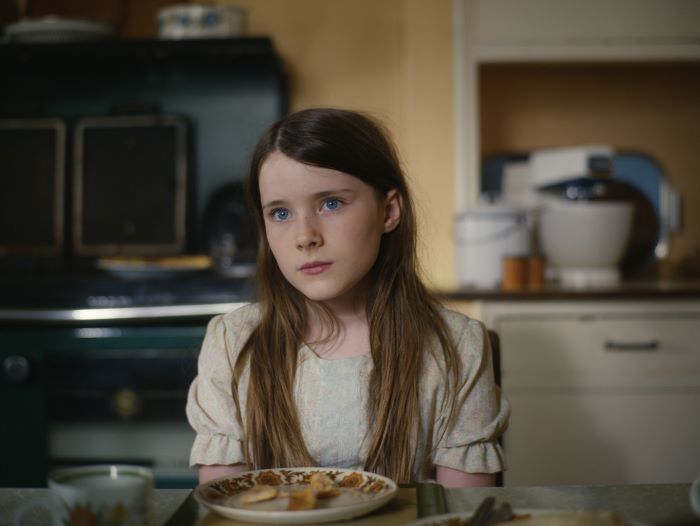![]() In this era of bloated cinematic excess (see, Babylon), it’s a thrill to watch a deceptively simple, beautifully crafted film that packs more of an emotional punch in its compact 95 minutes than what is found in hours of special effects and over-the-top action sequences. Less is definitely more, and silence speaks volumes in writer-director Colm Bairéad’s impressive debut, the first Irish-language movie to be nominated for an Oscar in the Best International Feature (formerly Best Foreign Language) category.
In this era of bloated cinematic excess (see, Babylon), it’s a thrill to watch a deceptively simple, beautifully crafted film that packs more of an emotional punch in its compact 95 minutes than what is found in hours of special effects and over-the-top action sequences. Less is definitely more, and silence speaks volumes in writer-director Colm Bairéad’s impressive debut, the first Irish-language movie to be nominated for an Oscar in the Best International Feature (formerly Best Foreign Language) category.
The Quiet Girl, sensitively and faithfully adapted from Claire Keegan’s award-winning novella Foster, opens with nine-year-old Cáit (luminous newcomer Catherine Clinch) lying hidden in a field of tall grass as her older sisters impatiently call for her. Her lonely solitude is a refuge from a chaotic, impoverished domestic life only hinted at in the novella and fleshed out briefly in the beginning sequences. Falling behind in her reading and labeled the “weirdo” at school (the painfully shy girl flees into the woods at recess), Cáit hides in plain sight amid the overcrowded disorder at home and sits quietly, unnoticed, in the pub as her feckless, idle Da (Michael Patric) finishes off a pint.
About to give birth to her fifth child, a harried, distracted Mam (Kate Nic Chonaonaigh) decides to send Cáit to stay with her more prosperous cousin Eibhlín (a sensitive Carrie Crowley) and her husband, Seán (a stoic Andrew Bennett), at their small dairy farm for the summer. A barely civil Da delivers his daughter to the couple, gruffly warning them that she’ll eat them out of house and home. “We’ll keep the child gladly,” replies Eibhlín.
In his eagerness to get away, Da drives off with Cáit’s suitcase. Eibhlín consoles the distraught girl with warm tenderness, giving her a much-needed bath, gently brushing her hair, and even adjusting the bedroom shade for her comfort. As Cáit falls asleep, Eibhlín whispers, “If you were mine, I’d never leave you with strangers.” Seán, though a bit more distant, gradually softens up, surreptitiously leaving a cookie for Cáit to make up for the harsh words he earlier spoke in a moment of anger and panic.
Under this unaccustomed kindness, Cáit thrives, running with joy when Seán times her daily race to the postbox. She quietly observes the affection between the couple, so different from her parents’ tense relationship, and senses an unspoken sorrow in the train-themed wallpaper of her bedroom and the boys clothing she is given to wear.
Cáit’s emotional journey is beautifully reflected in director of photography Kate McCullough’s effective visuals, moving from the darker, grayer palette of Cáit’s miserable home life to a high summer brightness before fading to a melancholy golden glow as fall approaches and Cáit must return to her family.
There is a timeless quality to the film, thanks to the lovingly detailed designs of production designer Emma Lowney and costume designer Louisa Stanton. Although set in 1981 (a radio news program reports on the hunger strikers in Northern Ireland), The Quiet Girl has a 1950s feel. This is pre-Celtic Tiger Ireland, when money is short, snail mail is the standard form of communication, and people keep their emotions tightly under wraps.
The cast is uniformly good but the special standouts are Crowley and Clinch, who expresses so much with her dark blue eyes. When a garrulous, nosy neighbor derides Cáit as “a quiet one,” Seán defends her, “She says as much as she needs to say.”







Leave A Comment